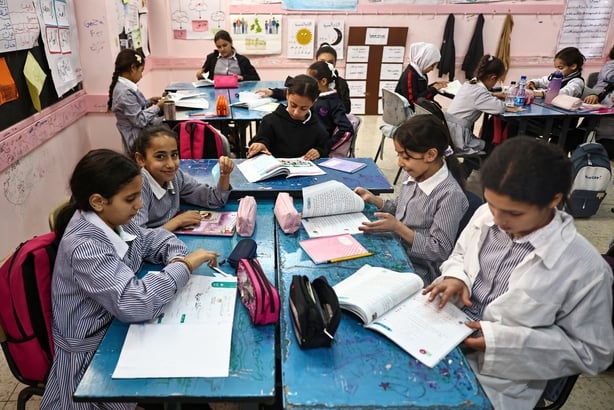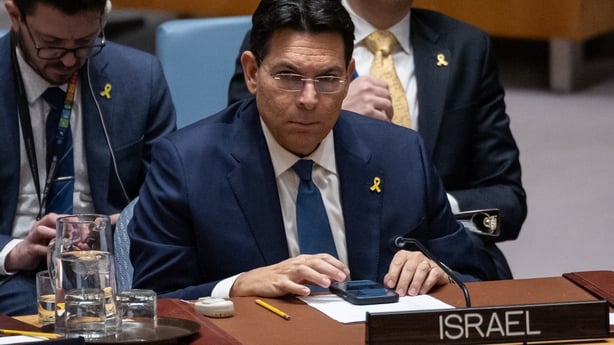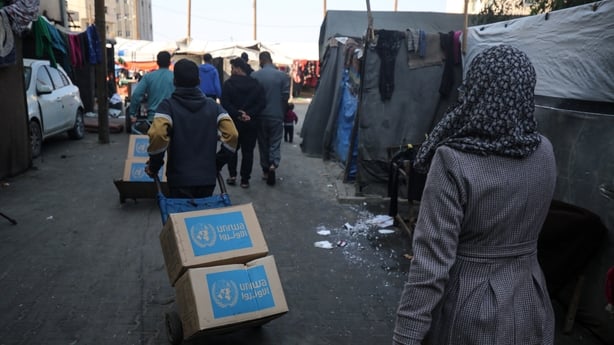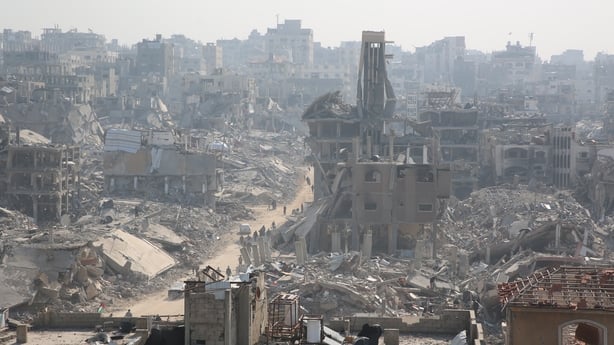Right down to the moment, Israel's new legislation banning UNRWA operations on Israeli soil came into effect on Thursday, UN officials insisted they would "stay and deliver" for the Palestinian population until they could no longer do so.
"We will not stop, we’re not bowing down to this," said UNRWA spokesperson Jonathan Fowler.
However, the organisation faced deep uncertainty over its future ability to carry on.
UNRWA offices in occupied East Jerusalem were the first to feel the impact on Wednesday night when the visas of UNRWA’s international staff expired.
"A couple of dozen staff had to leave Jerusalem overnight," Juliette Touma, UNRWA director of communications told RTÉ News. They relocated to UNRWA’s office in Amman, Jordan.
Local Palestinian staff remained in place and UNRWA did not have plans to close their field headquarters in occupied East Jerusalem, Ms Touma said.
As the ban came into force, protesters gathered outside the headquarters. Some defaced the building’s UNRWA sign with cans of spray paint.
"There was a small demonstration early this morning that disbanded very quickly," said Stéphane Dujarric, spokesperson for the UN Secretary-General.
"The building continues to fly the UN flag," he said, adding that staff had taken precautions ahead of time.
"All the equipment inside, files, computers, everything had been removed, our vehicles as well," he said, "and of course, the some two dozen international staff whose visas were no longer valid have left for Jordan."
Mr Dujarric said the remaining staff continued to work at home, in clinics, or other places of work beyond the administrative offices.
Schools, of which UNRWA runs nearly a hundred across the West Bank, were on a break when the law took effect. Students are due to return to class today.
However, despite UNRWA's stated commitment to stay, confusion remained over how the organisation could, in practice, continue to carry out its operations.

"We do know that the practical impacts, the uncertainty mean that our operations could be substantially affected," Jonathan Fowler acknowledged.
The legislation was passed by the Knesset in October, with the provision of a 90-day period for the UN to make arrangements to shift responsibility to alternative agencies. UN officials said that was impossible, given UNRWA’s "unique" role in the occupied Palestinian Territories.
This week, several UN member states weighed in on UNRWA’s side, appealing to Israel to rescind the legislation.
Ireland co-signed a statement to the Security Council alongside Belgium, Luxembourg, Malta, Norway, Slovenia and Spain underscoring their support for the agency. On Friday, Britain, France and Germany expressed their "grave concern" over the potential disruption to aid operations.
UN Secretary-General António Guterres wrote to the Israeli Ambassador stating that Israel was not entitled under international law to "exercise sovereign powers in any part of the Occupied Palestinian Territory including East Jerusalem".
The UN Chief also indicated that Israeli authorities had not responded to his requests to engage in consultations on "matters arising from the adoption of the two pieces of legislation," adding that the UN stood ready to "enter into such consultations and negotiations".
But the US Mission to the UN, said it "supported the implementation" of the legislation and accused UNRWA of "exaggerating the effects of the laws".
The ban followed Israeli allegations that several UNRWA staff members were involved in the Hamas-led attacks on Israel on 7 October 2023.
A UN internal investigation found that in nine of the cases: "the evidence – if authenticated and corroborated - could indicate that the UNRWA staff members may have been involved in the attacks of 7 October".
UN officials said they were unable to independently verify the evidence as it remained in Israel’s possession but terminated the employment contracts of the nine individuals.
Ahead of the ban this week, the Israeli Ambassador to the United Nations Danny Danon reiterated the implication of the two new laws.

"The organisation is prohibited from maintaining any representative office, service or activity in our territories," Ambassador Danon said. UNRWA must cease all activities and evacuate its premises in Jerusalem adding, "Israel will terminate any cooperation, communication or contact with UNRWA or anyone acting on its behalf".
"This decision comes after years of good-faith efforts to compel you to act against Hamas' infiltration of UNRWA. The decision also reflects a grim reality: that UNRWA has failed morally and professionally and harmed people who were supposed to receive necessary support," he said.
However, Israeli authorities were vague on how or over what time frame they intend to implement the laws, according to Jørgen Jensehaugen, senior researcher at the Peace Research Institute in Oslo.
"It’s not exactly guesswork," he said, "but reading through Israeli statements and documents doesn’t really give a clear signal, which makes it very challenging".
In Gaza, where UNRWA employs 13,000 local staff and runs 300 premises, the new laws were expected to have imminent practical implications for aid distribution.
UN officials described UNRWA as the "backbone of the humanitarian response" there, meaning that it is the only organisation with a comprehensive network aid storage and distribution capabilities in the territory.

The prohibition on Israeli officials interacting with UNRWA personnel could prevent UNRWA personnel or supplies from passing through Israeli-military controlled checkpoints, forcing its Gaza humanitarian operations to grind to a halt, UN officials said, and putting the hostage-ceasefire deal in jeopardy.
In an address to the UN Security Council on Tuesday, the head of UNRWA Philippe Lazzarini pushed back against suggestions by Israel's government that UNRWA played a "negligible role in providing humanitarian assistance in Gaza," saying that the agency had delivered "two-thirds of all food assistance, provided shelter to over a million displaced persons, and vaccinated a quarter of a million children against polio," since October 2023.
Less quantifiable than the medical and food aid UNRWA distributed to the population of Gaza, Mr Lazzarini told the Security Council, was "community acceptance".
"Palestinians know and trust UNRWA," he said.
"For them, UNRWA is the doctors and nurses providing healthcare; the aid workers distributing food; and the mechanics and engineers building and repairing wells for clean drinking water," he continued, adding "the agency’s mere presence brings stability amid profound uncertainty.
UNRWA was established in 1949 by the General Assembly to provide "direct relief and work programmes," for the some 750,000 Palestinians forcibly displaced during the first Arab-Israeli War in 1948. The number of Palestinian refugees eligible for UNRWA services has since swelled to some 6 million people, living in the Occupied Palestinian Territories, Jordan, Syria and Lebanon.
But if UNRWA has the trust of Palestinians, the opposite is true of Israelis.

Israeli government officials have long accused the agency of being "part of the problem" by perpetuating the refugee status of Palestinian. They idea that UNRWA was "infiltrated by terrorists" which began on the right wing of Israeli politics has since become mainstream.
UNRWA officials said the allegations were part of a disinformation campaign to undermine the agency.
This week the freed British-Israeli hostage Emily Damari told the UK prime minister that she had been held in UNRWA facilities. UNRWA said they had vacated most of their premises at the beginning of the war but said the claims were "serious" and called for independent investigations into the "misuse" of UNRWA facilities.
But, the agency’s reputation in Israel was beyond repair, analysts said.
"Hatred for UNRWA have become so thorough right through Israeli society," Jørgen Jensehaugen told RTÉ News.
"It’s no longer a left or right issue," he said and that should give us some indication that these laws "are not going to be stopped".
Over the coming weeks and months, UNRWA’s movements on the ground are likely to become increasingly difficult, he said. In addition, donor countries may be reluctant to pledge further contributions in the absence of international staff overseeing aid distribution.
The agency was already strapped for cash after several member states including its main donor, the United States, suspended funding in the wake of Israeli allegations that implicated UNRWA employees in the 7 October attacks.
All this is likely to lead to a slow stifling of the agency’s work.
For now, UNRWA officials said they were determined to carry on.
"We thrive on hope," said spokesperson Juliette Touma.







